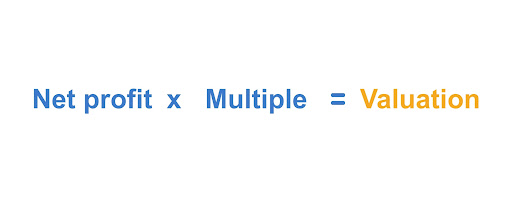Sell Your Business to Accelerate Your Wealth-Building Journey: A Business Valuation Guide

Why would you sell your business after all the time and effort you put into building it from the ground up and getting it to a point where it’s funding your lifestyle? And it’s not just a business but a brand that you love: your baby.
What you might not have considered is that when you sell your business, it can actually be a new chapter in your entrepreneurial journey. A way to open doors of opportunity for you to explore new ventures in your business and personal life.
Opening doors not just for you, but for your business, too.
You may not have the capacity to help your brand reach its full potential. So, why not cash out of your business for a capital reward that is probably larger than you’ve ever received in your life? At the same time, you’ll be putting your business on an escalator of growth by handing it over to a buyer who has the capital and resources to take it to its peak.
There are many benefits to selling your online business. The most important thing is that you sell your business for the right price.
How Online Business Valuations Work
The first thing to understand is that every business is unique in how it’s built and how it fits into the market.
That’s why it’s not only how much a business makes that determines its value, although that’s the most important factor. However, many other factors also affect a business’ value; for example, two businesses earning the same amount in monthly profits could be valued at different prices.
A business’ earnings are one part of the equation, the other key part is the business’ multiple.

The net profit of a business is usually taken from its 12-month average, though the time span can be smaller if the business is new or if recent major changes in profits mean that a 12-month average wouldn’t accurately reflect the current state of the business.
The multiple is calculated by the valuer of your business using a wide range of metrics.
The formula above is the most basic valuation formula, and it is the foundation of all the valuations we calculate as a brokerage because it is so fundamental to the state of a business.
The metrics that go into calculating the multiple can be broken down into three key disciplines.
The Business Blueprints
Business blueprints are the surface factors a potential buyer will assess first. The buyer will have key criteria that they need to tick off before they dive deeper into your business.
The first thing a buyer will look at is your business model to see if it fits their portfolio criteria or their expertise.
The second factor they might look at is the age of your business. This is important because older businesses are better established in their niches than newer businesses, whereas with newer businesses, there are opportunities to catch rapidly growing trends.
Another key factor is how much time it takes to operate your business. Most investors aren’t looking for time-intensive projects, so it’s important to them that your business requires minimal time to run.
Next, a buyer will ask to see your profit history, preferably in the form of a profit-and-loss (P&L) statement. Your business’ financial data tells the buyer about your business’ history and gives them a good idea of its financial health. The same goes for your site or store’s traffic history.
Once they’ve ticked off these surface factors, they’ll dig deeper into your business.
The Business Foundations
One of the strengths of a business is its structure. Building your business with strong foundations secures its earnings and makes it a more desirable asset for investors.
The key structural areas that make for solid business foundations are traffic and revenue streams, product deliverability systems, and defensibility.
A business that is reliant on just one source for each of these areas—for example, a blog that drives 90% or more of its traffic from Google, earns from just one or two affiliate networks, and has a brand that’s easy to replicate—doesn’t have the strongest foundations.
Though a business could be earning a lot of money with this setup, it’s susceptible to single points of failure. A blog that has multiple traffic sources earns from a range of affiliate programs or other related revenue streams (such as paid advertising) and has a unique brand and a large audience is likely to be valued higher than the blog in the previous example.
Speaking of audiences, as you’ve grown your business, you will have built a number of valuable assets that will also be considered in your business’ valuation.
The Business Building Blocks
Once a potential buyer has a thorough understanding of your business’ history and structure, they will look to see if it has any assets that both make the business a strong brand and offer opportunities for growth.
The main asset a business has is its audience.
The size of a business’ audience is a sign of its brand strength. A large audience offers many opportunities for profits and can help a brand scale new heights. The two main forms audiences come in are email lists and social media followers, so if you have either or both of these assets, they will count towards your business’ final valuation.
Beyond a business’ audience are other assets, such as eCommerce platform accounts, products, trademarks, domains and websites, employee and supplier contracts, affiliate contracts, and marketing assets such as advertising accounts.
All of these assets represent the building blocks of the business, and high-quality assets can add a lot of value to a business.
Now that you understand what factors go into valuing your business, you might wonder what the next step would be if you were to sell. It starts with getting your business ready for sale.
How to Prepare Your Business for a Maximum Profit Exit
To successfully exit your business, it needs to be ready for a new owner to take over.
As an added benefit of preparing your business for sale, you will actually improve your business and likely make it more profitable and scalable. So, it is worthwhile to follow these steps whether you’re going to sell now, in the future, or never.
The first place to start is with your business’ numbers.
Organizing Your Finances and Analytics
Your business’ number one goal is to generate profit. That’s why your business’ numbers are what hold it together.
Some entrepreneurs are more on top of this side of their business than others, but all entrepreneurs need to have clear finance and analytics tracking in place to run their businesses effectively. Those who know their numbers well have P&Ls for their finances and an analytics dashboard set up for their traffic figures.
You can have an accountant create a P&L for you if you’re less strong in that area or if you don’t have the time to produce one. This statement should cover the lifetime of your business to give that potential buyer a clear picture of your business’ history. It will also help your broker classify your business’ earnings and expenses. Remember, you know your business best.
Before selling through a broker like us, you need to have at least three months of traffic analytics data. You can track your site’s traffic using tools such as Google Analytics. You also need this data to present to a potential buyer because it also tells the history of the business.
While you’re tidying up your business’ data, you might as well keep going and tidy up your operations, too.
Arranging Your Operations
How your business operates is crucial to its success.
Imagine a visit to a hectic restaurant where orders are being missed and the staff are making mistakes. At its core, the quality of the service comes down to the quality of the operational structure in place.
If you find yourself scrambling just to keep your business running, then it’s time to get your operations in order. The best way to do this is to create standard operating procedures (SOPs).
SOPs are documented procedures. By writing out your operational instructions step by step, you may even identify bottlenecks and inefficiencies that are slowing down your business.
Having SOPs in place with repeatable operations helps you mitigate the risk of operational failures and makes your business less time- and energy-intensive to run. Another key benefit of organizing your operations is that you can start to outsource and automate repetitive tasks that take up your time or specialized operations that require expertise.
Outsourcing and Automating
The less time your business needs from you as the owner, the more desirable an asset it is. This is not only because a hands-off business doesn’t distract an investor from their other assets, but also because the business is scalable.
Having employees or freelancers running certain operations in your business and software tools taking care of others frees up your time to focus on big-picture growth.
One simple way to outsource operations is to hire a virtual assistant (VA). They are able to carry out those repetitive tasks that don’t require any expertise, and they’re cost-effective hires.
For more specialized tasks, such as web design, product design, or SEO content writing, you can look to freelancer platforms to acquire talent.
However, some operations are better run by a computer than by a human. This is where software tools are really helpful. Classic examples of where entrepreneurs find software tools useful are inventory management, social media posting, affiliate network tracking, and accounting.
Outsourcing is a great way to free yourself from the stress of your business. You also make your business easier to run, scalable, and profitable; ultimately, it is a more desirable investment asset.
By following all the above steps, you give yourself the option to free yourself from your business entirely through a profitable exit. When the time to leave comes, you have two main options.
Where Can You Sell Your Business?
There are two routes you can take to sell your business: the private route and the online business broker route.
You might have already had business acquirers reaching out to you with offers to buy your business. If so, what do you do next?
Selling your pride and joy is a long process with many steps, and you want to make sure you are making the smart steps along the way to get you the maximum possible sale.
When you sell privately, it’s all up to you, from preparing your business for sale, finding the right buyer, and negotiating the best price, to migrating your business over to the buyer and collecting the funds.
As you can probably imagine, there is a lot that goes into each of those stages, and there is a lot you need to know. When you sell through an online business broker, it’s a lot easier.
If you sell through an online business broker, you get the broker’s expertise to help you arrive at an accurate valuation, find buyers for you, and assist you in negotiating the best deal to get your business sold.
At Empire Flippers, we offer a little bit extra. We help you prepare your P&L for the most accurate valuation, we migrate your business over to the buyer for you, and we collect your funds to make sure you get paid. What’s more, we offer a free service whereby we create an exit plan for you to prepare your business for sale.
Hopefully, this article has helped you realize that you don’t just have a business; you have a valuable asset that you could one day cash out of for a capital windfall larger than you’ve ever received. By knowing how to accurately value your business, you set yourself up for a successful exit.
Featured image by Medienstürmer on Unsplash

NICE POSTING THANKS
nice posting
NICE BLOG